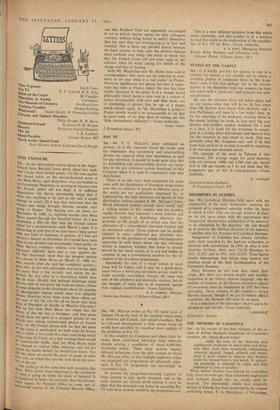Time Exposure Pay Tv Stains on the Carpet Minorities in
Austria The Nlemoirs of Casanova Teething Troubles
Whitesvash? Isabel Q)uiglc. R Libraries and Authors' Royalties Philip Bryant, H. D. Barry Professor D. W. Brogan Professor Oswald Doughty J. R. Lambert George Brown, MP
Leigh Vance R. P. Gabriel, B. R. King M. Vassighy 'Carinthian' Geoffrey Gorer Monica Furlong Furneaux Jordan Clermont-Ferrand Rossetti The six Island Paradise David Archer Appeal Fund Dom Morass, Patrick Swift and David Wright TIME EXPOSURE
As the unfortunate central figure in the Anglo- French farce Bernard Levin wrote about last week, may I make these further points : (1) The case against me based solely on the uncorroborated word of one Mme Becus, aged thirty-five--was not handed to an Examining Magistrate to investigate because even the French police did not think it of sufficient importance—the theory presumably being that if there was anything to be said on my side it would emerge in court. (2) I was first informed that the Charge was being brought thirteen months after going to France. The hearing was set down for December 16, 1960, i.e., eighteen months after Mme Beet's passed through her dreadful ordeal. As 1 was Producing a film on that date my French lawyer asked for a postponement until March 3 next. It is interesting to note that at no time have I been served With any kind of summons or process. If I had not briefed a lawyer on December 16 1 would have been tried in my absence and presumably found guilty on Mme Becus's evidence—without ever having been informed officially there was a case against me. (3) The documents show that my passport picture was shown to Mme Becus on March 31, 1960, i.e., nine months after she laid her complaint against a man who, by her own admission. was not in her sight for more than a few seconds, and whom she de- scribed the day after in a description which does not fit mine. Despite that perhaps irrelevant detail she was able to 'recognise' me from my photo. (There some disparity in the documents about the number of photographs among which mine was allegedly shown. However many there were, these others are not part of the file and for all we know may have been of President de Gaulle or Maurice Chevalier.) B ut by this date Mme Becus was aware that the driver of the car was a foreigner, and that alone would draw her gaze to a passport picture of one British face among normal-sized photos of French faces. (4) My French lawyer tells me that the scene of the crime is overlooked on both sides by houses and is within a few yards of a main road along which at that time (6.15 p.m. on a July evening) there would be considerable traffic. And yet Mme Becus made ob attempt to contact other witnesses and did not report the matter herself for twenty-four hours. Nor did she place on record the piece of paper or what have you on which she says she took down the num- ber of the car.
One could go on for some time with examples like these. What seems more important is the revelation 9f what is going on under the cloak of Interpol. It Is significant to learn, for example, that the Govern- ment regard the Passport Office as some sort of convenient annexe to the Criminal Records Office;
and that Scotland Yard are apparently encouraged to act as private inquiry agents for their colleagues overseas, without being bound to satisfy themselves that the case they are investigating is in fact well founded. Nor is there any parallel liaison between the legal systems to help undo the obvious damage these methods may bring—the result of which was that the French Court did not even reply to my solicitor when he wrote asking for details of the charge and date of hearing.
Both Mr. Macmillan and Mr. Butler have said in correspondence they must not be expected to com- ment on my case while it is 'sub judice' in France. Whatever significance this phrase has here it appar- ently has none in France, where the case has been widely discussed in the press. It is a strange moral philosophy which hands a man over to a system of justice incompatible with ours and then backs out of attempting to protect him by use of a slogan which doesn't apply. As Mr. Macmillan is going to France shortly would it be unreasonable to ask that he gives some of his time there to sorting out this 'little international difficulty'?—Yours faithfully,










































 Previous page
Previous page